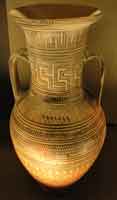|
|
An amphora is a type of ceramic vase with two handles, used for the transportation and storage of perishable goods and more rarely as containers for the ashes of the dead or as prize awards. Most were produced with a pointed base to allow them to be stored in an upright position by being partly embedded in sand or soft ground, while those with a ring base tended to be used for domestic or votive purposes. The latter were often glazed and decorated with figures, while purely functional amphorae were plain in appearance, often distinguished only by the stamps or signatures of their owners. Amphorae were invented by the ancient Greeks and adopted by the Romans as the principal means for transporting and storing wine, oil, olives, grain, fish, and other commodities. They were produced on an industrial scale from Greek times and used around the Mediterranean until about the 16th century. They are of great benefit to maritime archaeologists, as amphorae in a shipwreck can often indicate the age and nationality of the wreck. They are occasionally so well preserved that the original contents are still present, providing invaluable information on the eating habits and trading systems of the ancient Mediterranean peoples. The word amphora is Latin, derived from the Greek amphoreus (Αμφορέας) or amphiphoreus, a compound word combining amphi- ("on both sides") plus phoreus ("carrier"), from pherein ("to carry").
Amphoræ on display in Bodrum Castle, Turkey
a)
b) Athene standing and Heracles on a cline, Amphora. c. 520 BC, red figure part, b) black figure part
Retrieved from "http://en.wikipedia.org/"
 |
|
|||||||||||||||||



